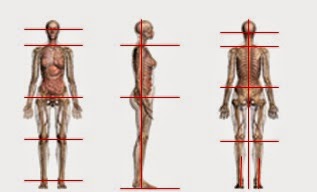How to Assess Posture
In my practice, posture is commonly assessed in 2 ways: Static and Dynamic.
Static Posture
Static posture refers to looking at posture while the body is stationary. While the patient is standing we see how gravity is acting on the body from head to toe. Static posture can also be assessed in the seated and lying positions.
Why would this be important? iIf you are able to maintain a neutral, effecient, body position, your body will be able to reduce the amount of force on your joints as well as decrease the energy require by your muscles. Unbalanced and unessential forces acting on the body can lead to stiff, tight or even painful joints and muscles. For long term joint health, proper posture is crucial.
A typical look at static posture is done by checking visually.
Why would this be important? iIf you are able to maintain a neutral, effecient, body position, your body will be able to reduce the amount of force on your joints as well as decrease the energy require by your muscles. Unbalanced and unessential forces acting on the body can lead to stiff, tight or even painful joints and muscles. For long term joint health, proper posture is crucial.
A typical look at static posture is done by checking visually.
For better sitting posture, CLICK HERE.
Dynamic Posture
Dynamic posture is the alignment of your body while you are moving. It is vital that you maintain good, symmetrical body posture while performing basic movements such as bending forward, rotating at the hips, shoulders and squatting.
As a Chiropractor, we look at your active and passive range of motion of your joints. This allows us to see if you are moving properly and efficiently.
Some Chiropractors utilize techniques such as Funtional Range Release and Conditioning to assess, treat and optimize all the joints in your body.
If joints do not move like they should, compensations will result in STIFFNESS in joints, TIGHTNESS in muscles and even PAIN.
Is your spine moving like a proper spine? Is your shoulder moving like your shoulder should?
Chiropractors also use Selective Functional Movement Assessment(SFMA) to distinguish pain and dysfunction (problems seemingly unrelated to a body complaint) and where possible, identify where exercise is indicated or contraindicated. SFMA helps the Chiropractor in musculoskeletal evaluation, diagnosis and treatment. It also allows us to choose the best possible rehabilitative and therapeutic techniques and exercises.
Have you had your posture assessed?
What do you do to maintain good posture? What do you do to maintain your long term joint health?
Have your Chiropractor assess and treat your body posture to help you live better.


